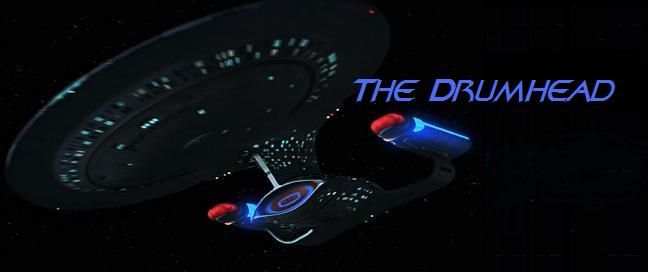
The Enterprise recently experienced an explosion in the engine room, damaging the warp core, leading to an investigation to find the cause. The investigation leads them to a Klingon exchange officer who was discovered trying to access computer information not available to him and also collecting data information for dispersal using spy-tech hidden in a hypo-syringe (the pretense being he needed regular injections for an illness.)
Starfleet has sent to the Enterprise a special investigator, Admiral Satie, who was responsible for uncovering the attempts to take over The Federation "three years ago" (very likely this is lip service to wrap up the loose ends from Season 1's "Conspiracy.") She brings with her as her entourage a Betazoid co-counselor and an alien woman who serves as a stenographer and process server.
The investigation mounts as Satie is convinced of a greater conspiracy being on the ship even after the Klingon double-agent is outed and it's discovered the explosion in the warp core was the result of a sub-microscopic manufacturing defect and not sabotage.
Her attention largely focuses on a young enlisted man whose records and claims are that his paternal grandfather was Vulcan when in actuality it turns out he was Romulan. As the investigation continues and grows more intense Picard realizes more and more a problem building on the ship that flirts with violating the civil rights of the crew and treads into "guilty until prove innocent." During his own questioning in front of another Admiral in Starfleet; Picard calls Satie's own actions in the process into question, saying that the recent events are essentially a violation of some founding legal principles and codes in the Federation. The Starfleet Admiral leaves, apparently not convinced by Satie's actions, after she goes into a hyper-patriotic rant that essentially accuses Picard of also being something of a traitor.
This is another one of those "courtroom drama" episodes of TNG but unlike previous ones focuses a bit more on actual criminal trials (or at least pretrials) in the Federation and how they're carried out. It's interesting to see how present-day rights for accused persons in many Western countries has carried over into TNG's proposed future, including things like a right to an attorney and the right to remain silent.
The right to remain silent is especially poignant as many times a person opting to exercise this right services to cast the wrong kind of light on that person. The idea being that if a person is truly innocent, why would they keep quiet? Ergo, they must be guilty of something. This is played out in the episode as Worf begins an investigation into the contacts and background of the enlisted man who exercised this right, saying that if he had nothing to hide why did he take right? Picard tells Worf it is not a crime to use it, nor indicative one.
Picard's treatment and interactions with the enlisted man are very good and almost touching. As Picard truly sees that he's an innocent young man who had such aspirations to be in Starfleet and exploring that he forgo-ed being an officer and became an enlisted man instead. The only thing "wrong" with him being that a grandfather happened to be a current enemy.
Many, many aspects of this episode certain fits into the way many trials and interrogations are carried out today, particularly in how we treat "the enemy" by pre-supposing things about them based on how a culture they happened to be connected to behaves. This particularly can be seen in a post-9/11 America and how Muslims tend to be treated, and probably fits to some degree when the episode was made in how the then present and recent past USSR/Russia persons were treated.
The episode doesn't give a whole lot for most of the cast to do as much of the episode focuses on Picard, Admiral Satie, Crewman Tarses and to some degree Worf (who initially is accepted by Satie and her entourage but soon his own history when it comes to family members collaborating with Romulans comes into question.)
A very subtle episode and one we could call a bottle episode if it wasn't for such an extensive guest cast (something bottle episodes don't usually have) but it manages to pull of a message and situation that'll likely ring true in any political or cultural environment and time.
Picard's own loyalties to Starfleet are called into question based on how many times he's broken the Prime Directive and other presumed mistakes he's made during his tenure on the Enterprise which, again, sort of goes with the hyper-loyal idea some political extremes can have in the "You're not less than 100% with us or you're against us" sense.
Really, just a very thoughtful episode that can give one much to think about or see in the current climate. Its message rings as much true now as it did in 1991.
If there's one quibble I have it's that Satie's impassioned speech is a bit over-the-top. The actress does an otherwise fine in the rest of the episode but her delivery of her big speech just comes across as a little over-the-top and kind of corny.
Also, in the line of nitpicking, this goes to a sort of discussion in another thread were it was discussed when the Enterprise's warp engines should be seen glowing. Granted the ship looks better with the engines on, but this is an episode where the engines should have been shown to be off given that the warp core is offline. Other episodes where the warp core is offline or being worked on the engines are shown to be off but in this one the engines are always glowing.
Again, overall, I just find this to be a great episode.
Last edited:

